The member representing Etinan/ Nsit Ibom /Nsit Ubium Federal Constituency, Mr Onofiok Luke, has decried the drop in the number of medical personnel in the country. Delivering a keynote address on the theme: “STEMMING THE TIDE OF BRAIN DRAIN IN NIGERIA: THE WAY FORWARD” at the National Executive Council meeting of the National Association of Government General Medical and Dental Practitioners (NAGGMDP) held on Friday in Uyo, Luke said the situation is worrisome and if not checked would pose serious threat to health care delivery in the country.
He described the health system as most vital resource and called for thorough infrastructural development, enactment of relevant laws for the sector, experienced and robust public health system handled by some of the best personnel in the world.
The lawmaker said that it is sad to note that despite the hazard associated with the job of health care workers, not much has been done to better their lives.
“The healthcare industry is one of the most hazardous environments to work in. Employees in this industry are constantly exposed to a complex variety of health and safety hazards in the course of their work ranging from biological exposure to disease causing organisms or exposure to chemicals. Apart from physical hazards such as exposure to radiation and noise, there are also ergonomic issues such as heavy lifting and standing for long periods. Long working hours and shift work add to the stress of work”.

“Sadly, while we constantly pressure our health workers to increase productivity, this precarious nature of work is not followed through with attendant increase in wages, working conditions and living standards by government. This situation has only increased the frustration of our health professionals who also find alternative destinations where their input will be valued and their pay commensurate with the level of work done”, Luke said.
He called on government to improve the welfare of health workers to reduce the brain drain that the nation is encountering. According to him; “We are constantly experiencing a brain drain in our country and this is not unconnected to the desire to lead better lives, experience working systems and convenient economic opportunities where they can create value and be rewarded for that”.
“Over the last decade, the migration of medical doctors from Nigeria has increased. The NOI Poll in 2018 revealed that 88% of doctors in Nigeria were seeking employment abroad. Furthermore, between 2015 and 2021, about 4,528 Nigerian-trained doctors have migrated to the United Kingdom (UK). This worrying trend exacerbates an already deteriorating health system, worsens the already depleted healthcare resources in our country and widens the gap in health inequities worldwide”.
“This situation is unlikely to stop, as Nigerian doctors continue to seek better working conditions abroad except we take intentional measures in reversing the trend”, Luke added.
Luke stated that there is urgent need to tackle the problem in the health sector and seek policy options to slow down or even reverse the outflow of healthcare professionals.
He recommended the upgrading of hospital facilities and equipment, increasing healthcare funding and improving work conditions for health workers as a major starting point in stemming the tide.
“I will like to note that nation building is a collective concern. We are all little pieces in the big puzzle and as such, I also recommend a grassroot approach that expands beyond government intervention and towards a collaborative effort among members of the general public, civil society organizations and all other stakeholders in strengthening the health care system in Nigeria”.
“As one solution, a reformed National Health Insurance Scheme that serves more than just the minority 1% of the population must be implemented. Other resolutions include stronger public-private partnerships and increased professional development and career opportunities for health professionals as essential steps to strengthen the health care system, increase the trust of our medical professionals and reduce the brain drain”.
He charge the government to implement the Abuja declaration where African governments committed in April 2001 to dedicate at least 15% of their annual budgets to the health sector.








